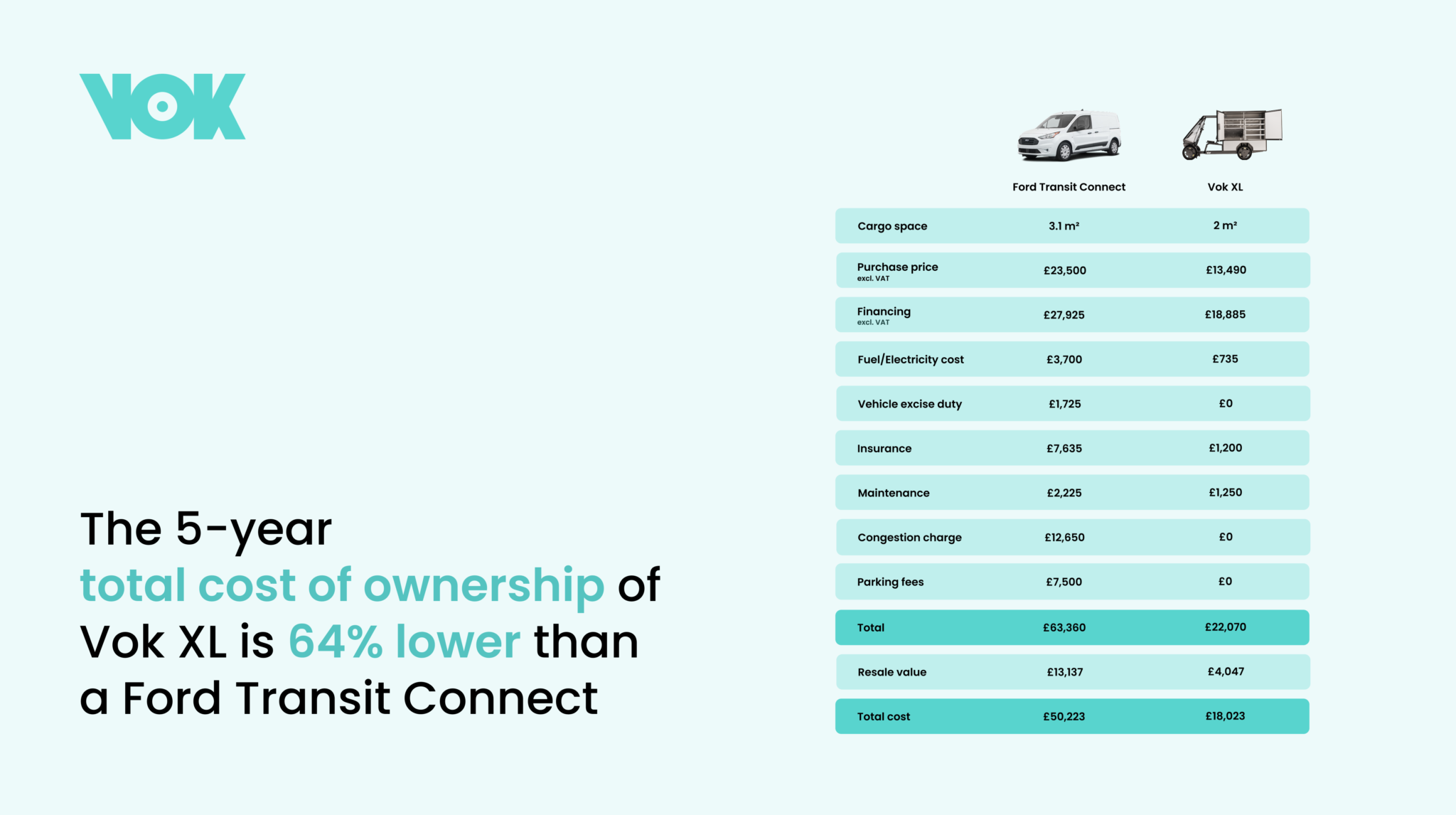The growing petrol prices, congestion charges, and other fees are making driving around the city for small deliveries and pickups extremely expensive. Rethinking how we handle urban mobility has never been more critical. The total cost of ownership (TCO) for traditional vans continues to rise, while electric alternatives like Vok Bikes offer serious savings — not just for the planet, but for your bottom line.
A 5-year cost comparison: Ford Transit Connect vs Vok XL
We ran the numbers on a small van and an electric cargo bike, both covering 7,500 miles annually. Over five years, that’s 37,500 miles which is a pretty standard benchmark for urban delivery operations.
In summary, Vok delivers impressive savings – cutting total costs by as much as 64%.
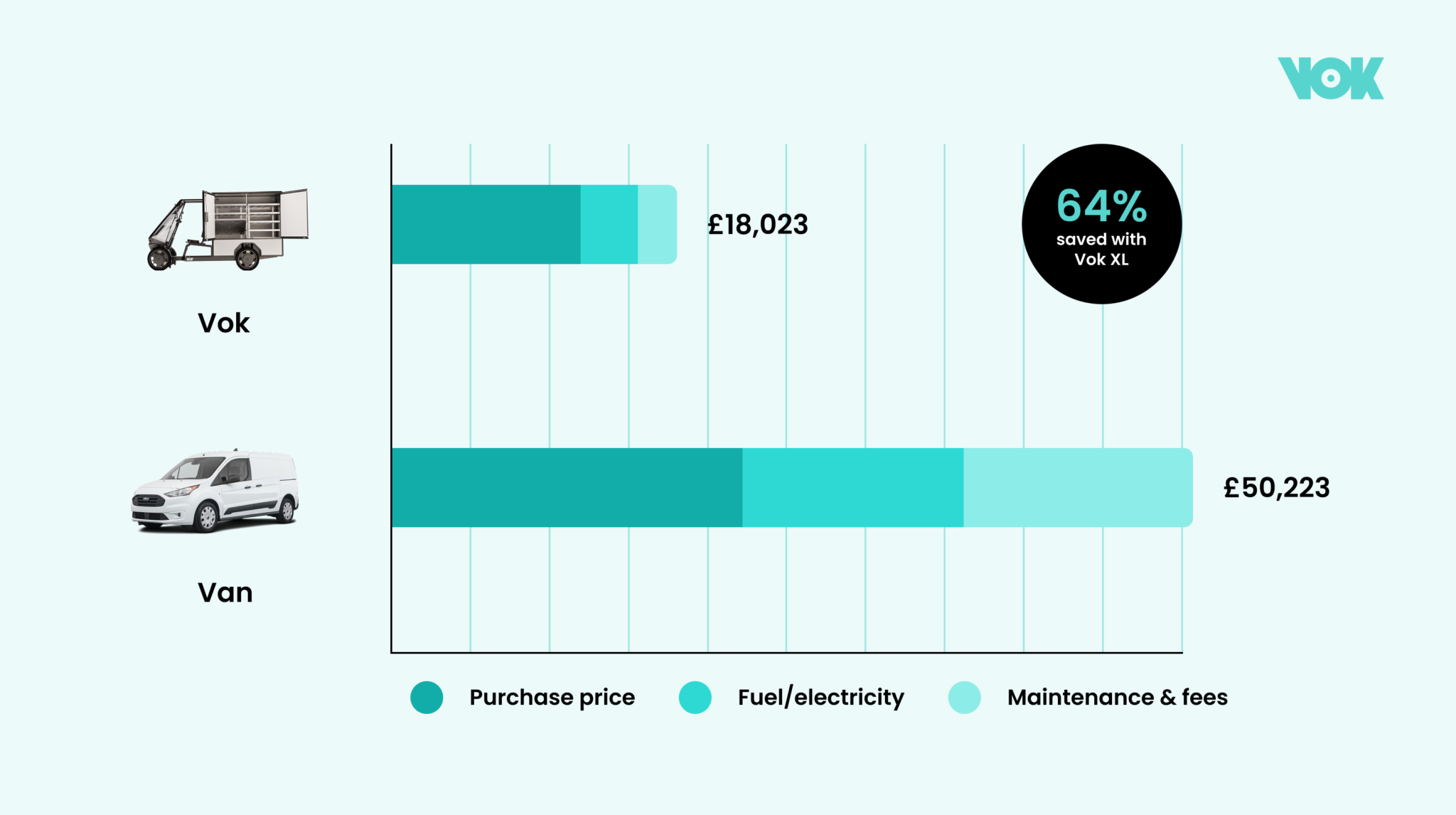
But let’s break it down! See the full comparison table:
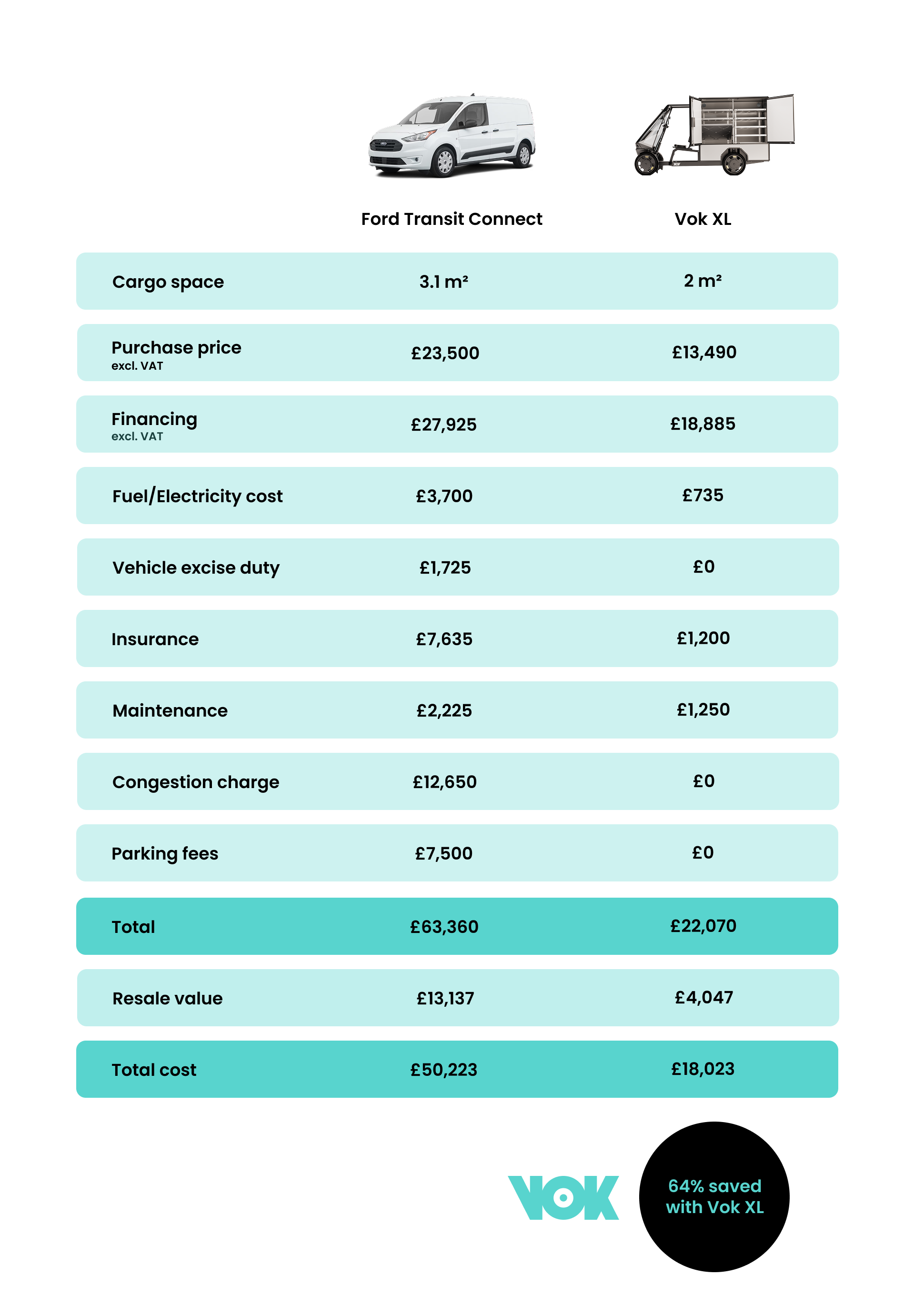
Vok beats the Ford Transit Connect on every cost front:
- Zero emissions tax
- No congestion charges
- No parking fees
- Insurance is 6x cheaper
- Fuel (electricity) is 5x cheaper
- Maintenance costs are nearly half
Even resale value holds up: after 5 years, Vok still retains ~22% of its original value.
Vok Bikes in action: Saving time, money, and miles for Handyman Station
London-based Handyman Station — the city’s first handyman company to run entirely on cargo bikes — has swapped vans for Vok XLs and slashed operating costs in the process. With no fuel, parking, or congestion charges to pay, their total cost of ownership has dropped by over 60%, aligning with Vok’s broader benchmark of £18,023 over 5 years compared to £50,223 for a small van. The bikes can carry up to 200 kg of tools and materials, fit through cycle lanes, and park right at the customer’s doorstep.
“Cargo bikes let us go where vans can’t. We skip the ULEZ charges, save time on traffic and parking, and arrive quicker — and fitter,” says founder Jeremy Lewis-Phillips.
For a busy service business in one of the world’s most congested cities, the move to e-cargo bikes wasn’t just greener — it was smarter and significantly more cost-effective.
Time is money too: Omniva’s couriers are now 20% faster
Speed matters! Another one of our clients, Omniva, found that in city centers, the Vok Bike is 20% faster than a car on comparable delivery routes. Other studies suggest the time advantage could reach up to 60%. Faster routes mean more deliveries — or less time needed per shift. Either way, you’re saving.
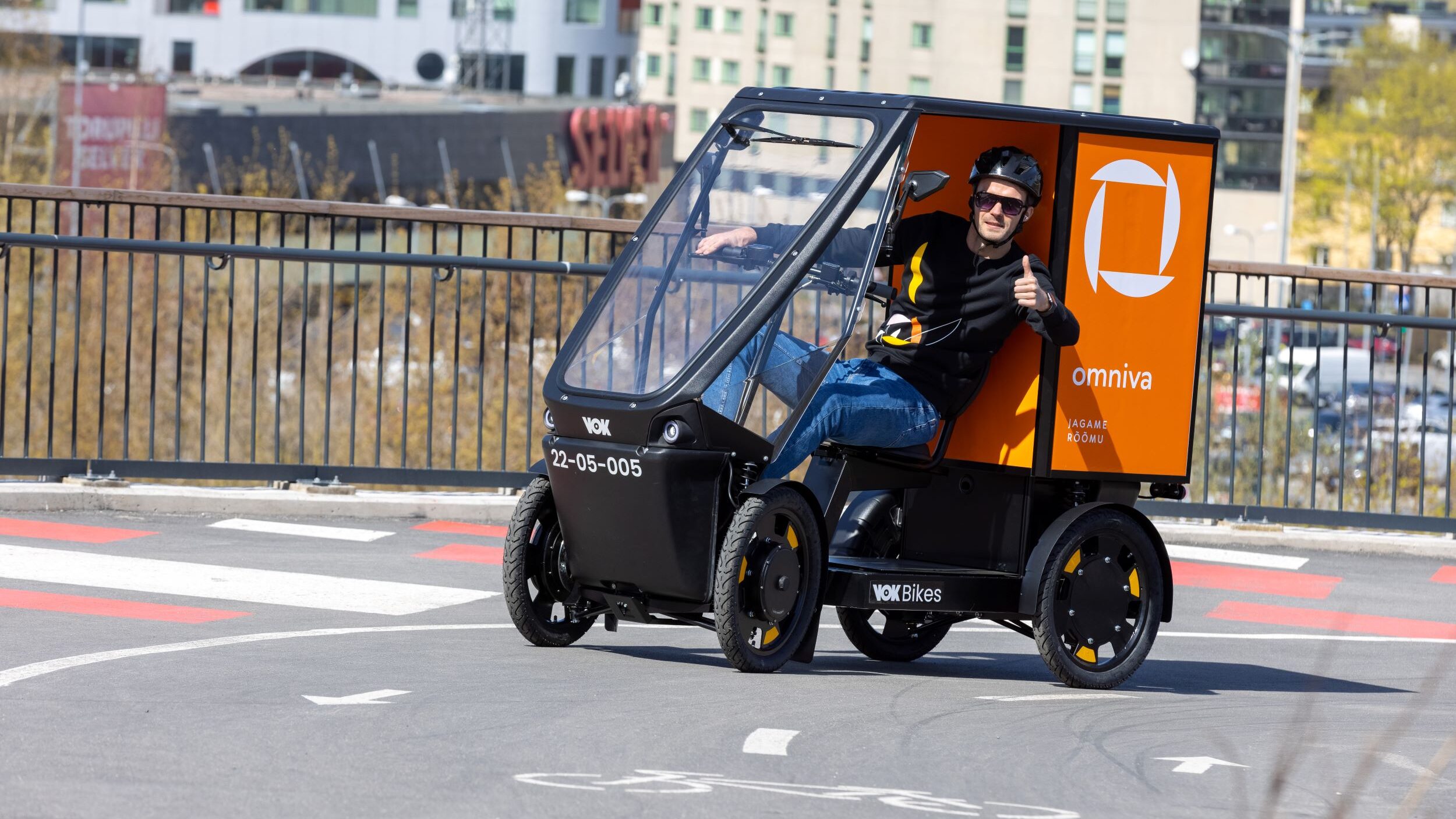
On top of that, swapping cars with e-cargo bikes extends the workforce pool. With no license required and an electric assist, Vok cargo bikes open the job market to a broader workforce — including older team members or those less comfortable behind the wheel of a van. Omniva’s senior postal workers ride Vok bikes with ease and enthusiasm.
Cargo space trade-offs – is it a dealbreaker?
Sure, a van offers more space — around 3.1m³ compared to the Vok XL’s 2m³. But most urban van deliveries don’t max out the load anyway. If you’re not regularly filling that van to the brim, a cargo bike might just be the more logical (and profitable) choice.
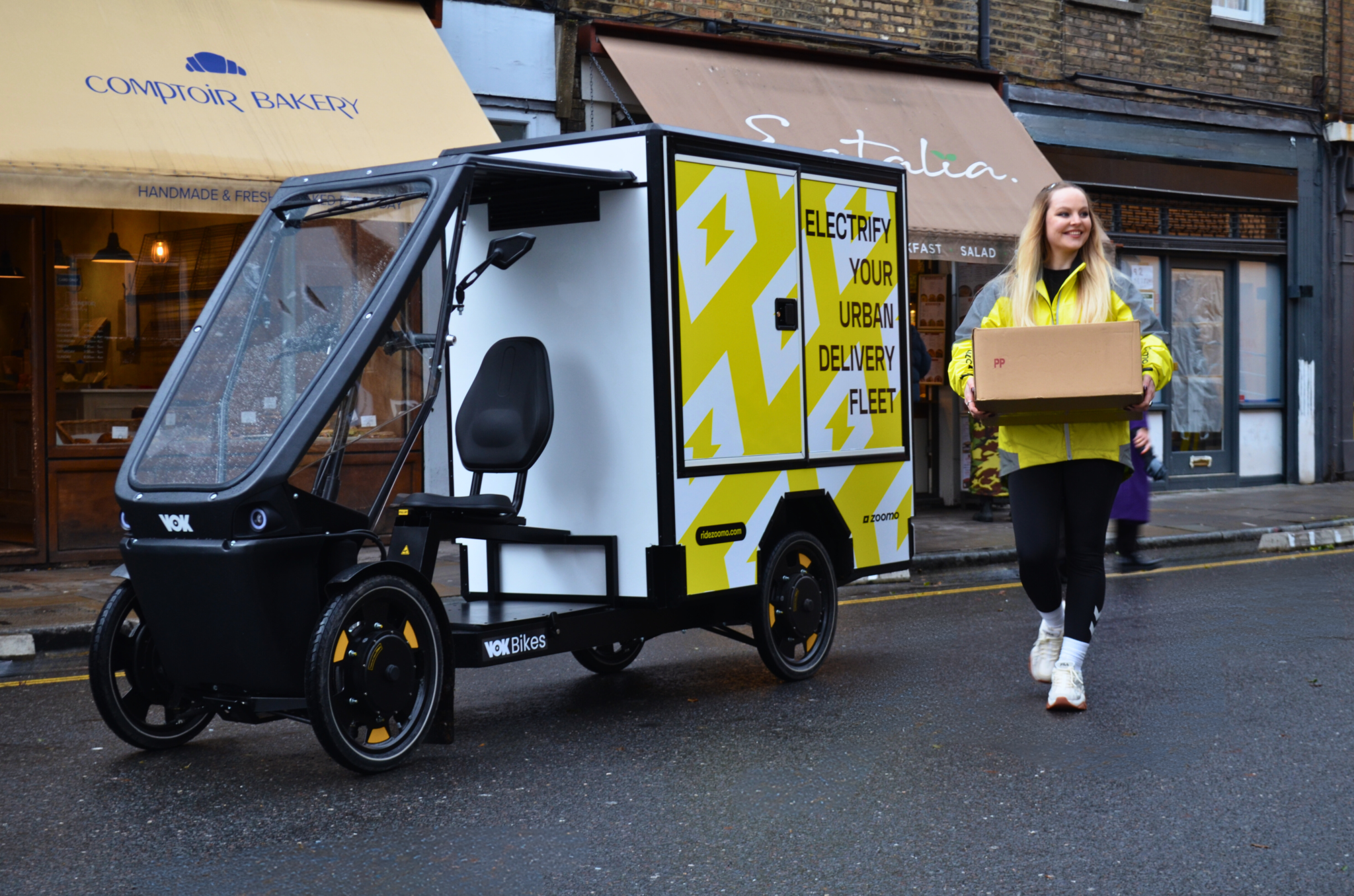
Not a deal-breaker for Zoomo, a global leader in last-mile electric fleet solutions.
Michael Johnson, Co-Founder of Zoomo, calls Vok e-cargo bikes true ‘van-replacers’. He continues saying: “We know our customers in urban logistics want this solution to achieve their sustainability goals and drive more efficient deliveries. We have traction from customers around the world, including the likes of Evri, who are reaping the benefits of integrating cargo bikes into their fleets, and we’re determined to build on this momentum.”
To prove the point, a recent ride test in London showed just how efficient the Vok XL can be. Zoomo’s CEO Michael himself rode the four-wheel cargo bike from Bethnal Green to a demo day at Camden Council’s depot — arriving in just 29 minutes. A van, leaving at the same time, took 49 minutes. The Vok XL fit comfortably in cycle lanes (at just 0.9m wide), kept pace with city traffic, and cut around queues where possible. Over half the route had bike lanes, and in the other stretches, the rider still felt safe, visible, and even relaxed — no parking stress, no ULEZ charges, no worries about speed cameras. Just smooth, efficient travel across London. For a growing number of companies, Vok offers more than enough cargo space — and far less hassle.
Conclusion: the numbers speak for themselves
The Vok XL’s TCO is less than half that of a small petrol-powered van when bought outright — and the difference is even greater when leased. That’s a potential saving of over £32,000 per vehicle in just five years. Multiply that across a fleet, and the benefits are hard to ignore.
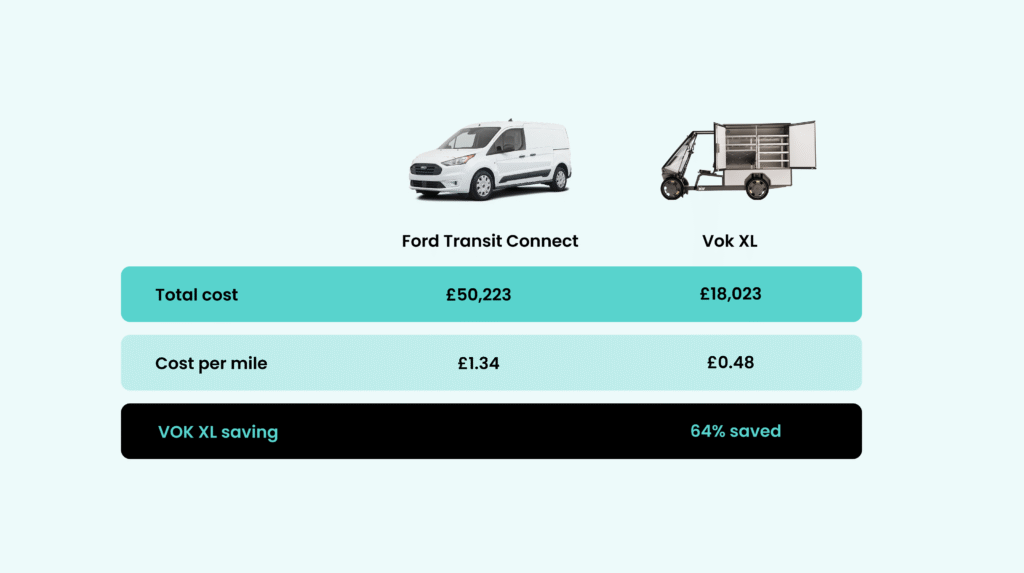
It’s time to rethink last-mile logistics. Electric cargo bikes aren’t just a sustainable choice — they’re a strategic one.
Ready to compare options or request a quote?
Check out Vok’s buying and leasing plans or get in touch with our sales team today. Send us an email [email protected].
Sources
- Typical purchase cost of a small van (e.g. Ford Transit Connect), https://www.ford.co.uk/shop/build-your-ford/ngc2/cv2/bodystyle?catalogId=WAEGB-CFJ-2022-TransitConnectGBR202525&code=BS-AE&bodystyle=BS-AE&planId=c
- Ford Transit Connect lease calculated assuming 6.99% interest rate with 0% down payment for 60 months, https://caredge.com/ford/transit-connect/financing?v=30%2C400&d=0&r=6.99&s=good&t=60&x=&y=0&m=7500
- Vok XL Bike lease calculated assuming 8% interest rate with 0% down payment for 60 months.
- Calculated based on the van covering the same distance per day (30 miles); diesel fuel for vans (53 miles per gallon), diesel 146.28 p/litre, https://www.rac.co.uk/drive/advice/fuel-watch/
- Cost of electricity for 7500 miles with Vok Bike 2.3 kWh battery (30 miles per charge) with electricity price of 25.72p/kWh
- Annual Vehicle Excise Duty (VED) charged on new commercial vehicles up to 3500 kg (N1) is a fixed rate of £345, https://www.ford.co.uk/content/dam/guxeu/uk/documents/price-list/commercial-vehicles/PL-all_new_transit_connect.pdf
- Average annual insurance of Ford Transit Connect for 5 years, https://caredge.com/ford/transit-connect/maintenance
- Average insurance cost per month for Vok Bike via Laka, 20£ per month for 5 years https://laka.co/gb
- Average Ford Transit Servicing costs for 37,500 miles over five years https://caredge.com/ford/transit-connect/maintenance
- Assuming London Congestion Charge on autopay at £10.50 per day
- Average figure per van, calculated using the median annual cost of penalty charges reported in the FTA PCN Survey 2012 divided by the average fleet size of fleets registered under the Fleet Operator Recognition Scheme (FORS), reported in Van travel trends in Great Britain, RAC Foundation, 2014
- Average resale Value for Ford Transit Connect after 5 years, https://caredge.com/ford/transit-connect/depreciation?y=0&p=30400&o=5&m=7500
- Resale Value for Vok XL: Calculated assuming a 25% annual depreciation rate over five years.
